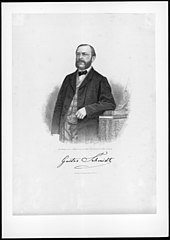Gustav Schmidt (composer, 1816)
Gustav Friedrich Schmidt (born September 1, 1816 in Weimar , † February 11, 1882 in Darmstadt ) was a German composer and conductor .
Life
Gustav Schmidt was the eldest son of a Weimar court official, his paternal grandmother came from the Allstedt family of musicians Martini. Schmidt, who was friends with Goethe's grandchildren, received his first music lessons in Weimar with Johann Nepomuk Hummel , Franz Carl Adelbert Eberwein and Johann Christian Lobe , and in between (1833–1836) studied law in Jena , here also lessons with the song composer J. Chr. C potter.
From 1840 to 1841 Schmidt lived in Leipzig as a pupil of Felix Mendelssohn Bartholdy , from 1841 he was theater conductor in Brno and in 1845 he was music director at the Würzburg theater . After privatizing in Hechingen and Leipzig from 1846 on , he brought his first opera, Prinz Eugen, the noble knight, to the stage in Frankfurt am Main , for which he had also written the text himself. After an engagement in Wiesbaden as the first conductor and opera director at the court theater, he went in exchange for Ludwig (Louis) Alexander Balthasar Schindelmeisser in 1851 as conductor at the Frankfurt City Theater , where his second opera Die Weiber von Weinsberg was performed. In 1864 he became theater conductor in Leipzig, and it was during this time that the operas La Réole and "Alibi" were written.
Schmidt was considered a patron of Berlioz and Wagner , whose Tannhäuser and Lohengrin he performed for the first time in Frankfurt.
In 1876 he was appointed court conductor to Darmstadt , where he worked until 1880 and died in 1882.
family
Schmidt was married to the actress Emilie Böttiger. A younger brother of his father was the actor and theater director Heinrich Schmidt , the eldest sister Maria Henrietta Carolina (1775-1837), widow of Herder's eldest son, the Hofmedicus Wilhelm Christian Gottfried Herder (1774-1806), married the lawyer Christian Gottlob Voigt in 1811 (1774–1813), son of Christian Gottlob von Voigt , who got into French captivity in the spring of 1813, from which he could be freed, but as a result of which he died shortly afterwards due to a febrile illness.
Works (selection)
Detailed list of works via "RISM-OPAC: Suche, Gustav Schmidt" (cannot be linked due to session ID)
- Prinz Eugen, the noble knight (text by Gustav Schmidt and Alexander Rost based on a poem by Ferdinand Freiligrath ), opera in 3 acts (July 27, 1847 Frankfurt am Main)
- Die Weiber von Weinsberg (also Weibertreue or Kaiser Konrad von Weinsberg ) (text and music by Gustav Schmidt), comic-romantic opera in 3 acts (February 16, 1858 Weimar, court theater, under the direction of Franz Liszt )
- La Réole ( Charlotte Birch-Pfeiffer ), Opera in 3 acts (Jan. 24, 1863 Breslau )
- Alibi or Die Fahrt ins Philisterium (Gustav Schmidt), comic operetta in 3 acts, op. 48 (February 1, 1880 Darmstadt, Hoftheater )
- Songs and chants, orchestral works, e.g. B. Bravour Variations on a Theme by Mozart: Ah! Vous dirai-je, maman for 1 voice, flute and orchestra
literature
- Schlumberger, Thiersch: German Biographical Encyclopedia . Volume 9, p. 40
- Esther Ferrier: German transmissions of the Divinia Commedia Dante Alighieris, 1960-1983: Ida and Walther von Wartburg, Benno Geiger, Christa Renate Köhler, Hans Werner Sokop: Comparative Analysis, Inferno XXXII, Purgatorio VIII, Paradiso XXXIII, Volume 105 . Verlag Walter de Gruyter, 1994, ISBN 978-3-11-014144-3 , p. 859, books.google.de
- Rudolf Roenneke: Franz Dingelstedts effectiveness at the Weimar court theater. A contribution to the history of theater in the 19th century. Verlag H. Adler, Greifswald, 1912, at Open Library and archive.org .
Web links
- Literature by and about Gustav Schmidt in the catalog of the German National Library
- Gustav Schmidt in the Bavarian Musicians' Lexicon Online (BMLO)
- List of stage works by Gustav Schmidt based on the MGG at Operone
Individual evidence
- ↑ Church book entry Hofkirche
- ^ Church book city church as well as state and society in the age of Goethe and new contributions to the history of the city of Weimar
- ^ Intelligence sheet of the free city of Frankfurt, 1862, p. 288
- ^ Bremer Sonntagsblatt: Organ des Künstlerverein, Volume 11, 1863, p. 47 and Süddeutsche Musik-Zeitung, Volume 12, 1863, p. 30
- ↑ Edwin Lindner: Richard Wagner on "Tannhäuser" . Breitkopf und Härtel Verlag, Leipzig 1914, p. 50, letter to G. Schmidt before Tannhauser performance in Frankfurt, July 11, 1851
- ↑ Das Musiktheater , p. 281
- ↑ according to the parish register of the city church
- ↑ Self-productions in classical Weimar , p. 308 at Google Books
- ↑ see Schmidt's memories , p. 9
- ^ Letter texts , index p. 691 at Google Books
- ↑ Marriage of Voigt's son in “Goethe's Briefe” p. 101 at Google Books
- ↑ Voigt, Christian Gottlob von in the German biography (mention by the father)
- ^ Marriage and death of Voigt's son. In: Goethe's letters to CG von Voigt , 1968, pp. 99-103
- ^ "Alexander Rost (1816–1875), son of a Weimar court official, author of numerous stage works, some of which were performed in Weimar". In: Wolfgang Rasch: Karl Gutzkow: Memories, reports and judgments of his contemporaries: a documentation , in p. 501
- ↑ Score Bravour Variations on a Theme by Mozart: Ah! Vous dirai-je, maman; for a voice, flute and orchestra in the catalog of the German National Library
| personal data | |
|---|---|
| SURNAME | Schmidt, Gustav |
| ALTERNATIVE NAMES | Schmidt, Gustav Friedrich (full name) |
| BRIEF DESCRIPTION | German composer and Kapellmeister |
| DATE OF BIRTH | September 1, 1816 |
| PLACE OF BIRTH | Weimar |
| DATE OF DEATH | February 11, 1882 |
| Place of death | Darmstadt |


